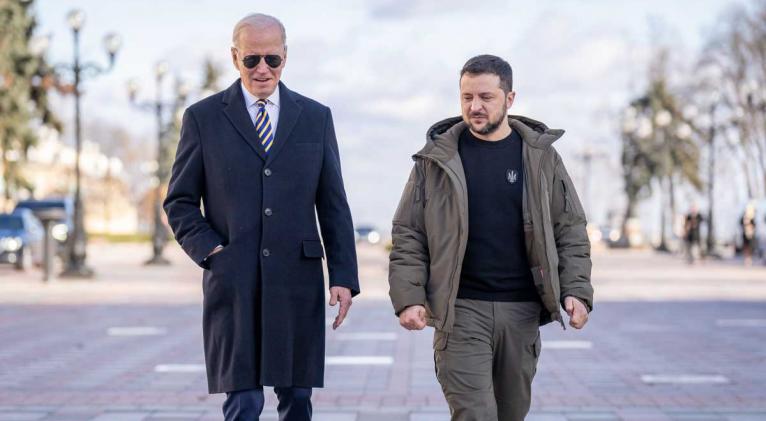Why the Rest of the World Has Not Aligned with the West Against Russia
especiales

Led by Washington, the democracies of Europe and North America have rallied behind Ukraine since the Russian invasion last February. Western state actors have coalesced around the narrative that the war in Ukraine is a battle between liberal democracy and freedom versus tyranny and imperialism. However, this narrative has failed to resonate with non-Western members of the international community and many state actors have been extremely hesitant to join the West in sanctioning Russia or aiding Ukraine.
In March last year, during a speech in the Polish capital, US President Joe Biden declared that the democracies of the world had been ‘revitalised with purpose and unity’ by the response to the invasion of Ukraine. Vice President Kamala Harris echoed similar sentiments in February this year, saying that ‘Our response to the Russian invasion is a demonstration of our collective commitment to uphold international rules and norms.’
To non-Western audiences, such rhetorical flourishes largely fell flat. Indeed, French President Emmanuel Macron publicly bemoaned the reluctance of some African governments to take a strong stance on the war, accusing them of ‘hypocrisy’ on the matter last July. However, it is hypocrisy that the West has been accused of when it comes to browbeating and lecturing the rest of the world on what stance they should take on the conflict. For example, S. Jaishankar, India’s minister of foreign affairs, complained that Europe thinks that ‘Europe’s problems are the world’s problems, but that the world’s problems are not Europe’s problems.’
The failure of American and European leaders’ talking points to resonate with their non-Western counterparts hints at a state of diminished soft power. Western liberal democracies are more sensitive to charges of hypocrisy than illiberal or authoritarian actors because they more readily emphasise moral imperatives, such as human rights and international norms and values. The US and its allies are right to decry the invasion of Ukraine by Russia, but there has been the niggling suggestion that Washington and its friends are casting stones from a glass house. The US-led invasion of Iraq – which was deemed illegal by former Secretary-General of the United Nations Kofi Anan – as well as the West’s alliances with some less than scrupulous regimes has weakened the West’s ability to project arguments from the proverbial moral high ground. For example, Indonesian analyst Radityo Dharmaputra wrote last year that ‘a dominant strand in Indonesian discussions of the Russian war on Ukraine has focused on American and Western hypocrisy.’
Beyond the issues of moral grandstanding and political messaging, non-Western states have more calculated reasons for choosing not to take a hard stance on Russia since the invasion. It goes without saying that for states like China who have locked horns with the US, a Russian victory in Ukraine is preferable, given the way it could reshape the global order more quickly in a multipolar direction. Meanwhile, for non-aligned states who have been careful to maintain their neutrality, what seems to them to be a distant war in Europe is not worth cutting ties over with Moscow. Even if a slow Russian decline seems inevitable, Moscow remains an indispensable partner to many countries in the Middle East, Africa, Asia, and Latin America.
Returning to Indonesia as an example, Jakarta has been at pains to maintain a neutral stance on the conflict. This is consistent with Indonesia’s long-term foreign policy preferences as a founding member of the Non-Aligned Movement (NAM) which emerged as a collective of countries who chose not to side with the US or the USSR during the Cold War. In July last year, Indonesian President Joko Widodo visited both Kyiv and Moscow on diplomatic missions. In March that same year, Indonesia did back a UN resolution denouncing Russia’s invasion of Ukraine but declined to impose sanctions or explicitly condemn Putin’s actions.
Brazil, a member of the BRICS – Brazil, Russia, India, China, and South Africa – has also maintained a neutral stance. Although Brazil is the only member of the BRICS to have supported the UN Assembly resolution calling on Russia to pull its troops out of Ukraine, the country’s president, Lula da Silva, has been critical of both the West and Zelensky. ‘This guy (Zelensky) is as responsible as Putin for the war,’ said Lula in May, before winning the presidency. He was also critical of Washington, saying that ‘Biden could have taken a plane to Moscow to talk to Putin. This is the kind of attitude you expect from a leader.’ Brazil’s position on the war has essentially been to advocate for a ceasefire, with Lula presenting himself as an impartial mediator for a possible peace settlement. But Lula’s peace terms differ strongly from Western and Ukrainian preferences. In April, Lula urged Ukraine to consider giving up Crimea and said that for peace to work, Zelensky ‘can not want everything.’
South Africa, a member of both the BRICS and the NAM, has displayed a similar preference for neutrality. In May, Sydney Mufamadi, security advisor to South African President Cyril Ramaphosa, said that the country was ‘actively non-aligned as far as the conflict is concerned.’ Thus far, South Africa has abstained from votes at the UN to condemn the war. Moreover, the South African government’s recent signalling that it would allow President Putin to attend a BRICS summit in the country, despite the International Criminal Court (ICC) having issued a warrant for his arrest, has rankled policymakers in the West. In May, the US ambassador to South Africa even alleged that the country had been supplying arms to Russia, although the American diplomat later apologised for the accusations.
During the Cold War, India’s first prime minister, Jawaharal Nehru, asserted ‘We are not pro-Russian, nor for that matter are we pro-American. We are pro-Indian.’ Decades later, those very same utterances would not have sounded out of place if voiced by the incumbent Indian prime minister, Narendra Modi. Although Modi met with Zelensky in May this year and previously urged Putin to ‘move onto a path of peace,’ he has refused to condemn Russia’s invasion, much to annoyance of Western policymakers.
Modi has hailed the bond between New Delhi and Moscow as ‘unbreakable’, and India has actually benefited from Western sanctions levied against Russia by purchasing Russian oil at deeply discounted prices. Last April, Washington urged New Delhi not to increase Russian oil imports, a request that was subsequently ignored. The US later backtracked and said that it was ‘comfortable’ with India’s energy policy, but the episode demonstrated New Delhi’s willingness to exercise its strategic autonomy despite the possibility of Western sanctions. India is also incentivised by its security concerns to maintain a cordial relationship with Russia. Even though New Delhi is seeking to diversify its military means with new European, American, and Israeli purchases, most of its military stockpile still consists of old Soviet-era equipment and India continues to rely on Russia in this domain. Moreover, Indian policymakers have been careful not to shut the door to the Kremlin for fear that Russia’s increasing isolation would push it closer to China, India’s foremost regional and geostrategic rival.
For Western foreign policy to be more affective, leaders in North America and Europe need to identify what calls to action will resonate with the rest of the world. Flowery rhetoric about democracy and freedom is unlikely to strike a chord in parts of the world that perceive the trumpeting of these values as dog whistles for Western interventionism. This is not to say that the West should abandon its values, but policymakers should try to read the room. International norms and values like national sovereignty, peace, and respect for established borders are more likely to resonate with a broader audience.
If the US and its allies aim to sway a greater a proportion of the non-aligned world to put pressure on Russia, they may try to do so by offering economic incentives. Although the emerging multilateral world order has somewhat weakened the West’s clout as well as its soft power, the American and European economies remain highly aspirational for developing countries. States who continue to trade with Russia could be sanctioned, but the West should be extremely cautious about this. There are already signs that extensive sanctions levied against Russia have made some US allies like Saudi Arabia nervous, and efforts are underway to diversify away from dependency on the American currency. The imposition of sanctions on non-aligned states who maintain relations with Russia could have a blowback affect, helping to hasten actions which could harm the interests of the US and its allies in the long-term, like de-dollarisation. For this reason, when dealing with non-aligned state actors, it may be more prudent to dangle the carrot, rather than threaten to wield the stick.














Add new comment